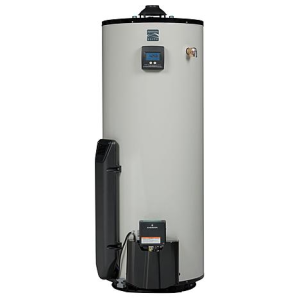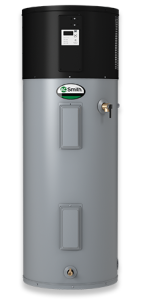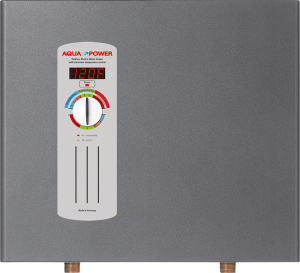Once upon a time, there were few choices when it came to replacing an old or broken hot water heater. The decision process had to do only with whether your home was entirely electric or gas powered. Today, though, you have a few different choices when it comes to water heaters. Now, selecting the right water heater depends on the amount of water used each day and where the water needs to be provided in your home. Choosing the best one, can can make a significant impact on your availability of continuous hot water and provide you with substantial energy savings each month. Yikes! Here’s to never running out of hot water, again…
Conventional Storage Water Heaters
Conventional storage water heaters work by heating and storing between 20 and 80 gallons of water in a tank. When you turn on a hot water tap anywhere in your home, heated water is pulled from the top of the tank, and cold water is pumped into the bottom and heated to replace it.
This type of water heater can be powered by electricity, natural gas, fuel oil, or propane. Because the stored water has to be kept hot even when not in use, conventional storage water heaters are the least efficient heaters available on the market. A well-insulated tank will lose less heat and waste less energy, but it’s still not optimal.
If you’ve ever run out of hot water while bathing or doing dishes, you most likely had a conventional storage water heater. You “ran out” of hot water because you were using the stored hot water at a faster rate than the water heater could heat the new, cold water entering the storage tank.
Hybrid Water Heaters
Instead of keeping a tank of standing stored hot water, a hybrid water heater will use a combination of an electric heating element and an advanced pump that extracts heat from ambient air to heat your water.
Essentially, instead of generating heat, this type of water heater transfers it from one place to another and is much more efficient than conventional storage water heaters. However, hybrid water heaters still rely on stored water to give you hot water on demand.
Though it takes a good deal less energy to heat water using this method, if the storage tank is too small, you can still run out of hot water if you use too much, too quickly. However, because the heating system is more efficient, the rate you’d have to use to go through all of the water, faster than the water heater could heat it, is much higher than it would be with a conventional storage water heater.
Tankless Water Heaters
Tankless water heaters are also sometimes called instantaneous or demand-type water heaters. They are the most efficient, cost-effective, and eco-friendly systems available for heating your home’s water. They’re also the most compact.
If you have a tankless water heater, when you turn on a hot water tap, cold water will flow through your water heater, and either an electric element or a gas burner (depending on the system and your home) will heat the water as it passes through. No hot water is stored, and the system only turns on when hot water is in use.
Tankless water heaters show the greatest improvements in energy efficiency for homes that do not use a lot of water. If you use less than 40 gallons of water per day in your home, you will likely see an energy savings of 24-34%. If you use less than 90 gallons of water per day, your energy savings will usually be closer to 8-14%. However, you can increase the energy efficiency in homes with high water consumption by installing a tankless water heater for each hot water outlet in the house or in locations where hot water is used the most.
For larger homes or larger families, you may want to consider a tankless hot water heater to avoid cold water surprises during morning showers. Additionally, if you live in a small house and are conscious of your water usage, a tankless water heating system can pay for itself very quickly.
Picking the right hot water heater can make a big difference in your energy bills each month, but more importantly you can choose a system that provides you with the amount of hot water you need for your hot water usage. There’s nothing worse than being the third person to shower and get shocked by a blast of cold water, because there’s no hot water left in the tank. When it comes to replacing your next hot water heater, choose wisely.
You’ll also like:
Six Ways to Make Money from the Solar Energy Boom
Fuel Neighbor Envy with Stunning LED Light Strips
Copenhagen Wheel makes your ordinary bike Electric!




I like these different kinds of water heaters. We have been wanting to find a new one because ours is pretty old. It was interesting to read about the conventional and hybrid water heaters. I did not realize there were those different types. This gives my husband and I a lot to think about as far as choosing one goes!
Hi Erika…thanks for the comment. Hope this article is helpful in your decision to choose a new hot water heater. Let us know if you have any questions.
It sure was nice when you said that tankless water heater is the most energy efficient one because it only needs to be on when hot water is needed. I have been hearing a lot about tankless water heaters, but I never actually got the chance to check it out. If it really is energy efficient, then I will give it a try since my mom is after saving money on the utility bills. I will still let her decide though. Thank you for sharing.